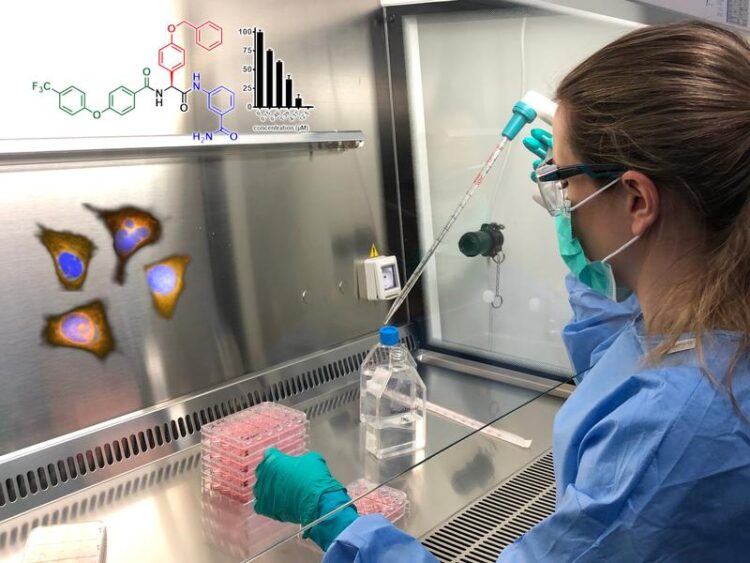Innovative Drug Discovery

Working with dengue virus in the BSL-3 lab of Heidelberg University. Also shown in this photomontage are fluorescent images of genetically engineered cells that contain the protease reporter constructs. In addition, the chemical structure of an antiviral compound and its effect on the replication of dengue virus is shown. | © Research Group Medicinal Chemistry, Institute of Pharmacy and Molecular Biotechnology (IPMB), Heidelberg University
Heidelberg research group seeks and develops inhibitors against flavi- and coronaviruses.
New drugs are intended to help stop viral zoonoses – infections that jump from animals to humans. To study suitable inhibitors, Prof. Dr Christian Klein from the Institute of Pharmacy and Molecular Biotechnology (IPMB) of Heidelberg University is receiving funding in the amount of 450,000 euros from the Volkswagen Foundation. The project is focussed on flavi- and coronaviruses, which cause infectious diseases such as Zika, dengue, West Nile Fever, and Middle East Respiratory Syndrome (MERS). The goal is to identify drugs to fight these pathogens and perform preclinical studies. To that end, the Heidelberg researcher and his team are working with a partner company in the pharmaceutical industry.
The Heidelberg scientists’ approach is based on new findings about so-called protease inhibitors, molecules that inhibit the activity of viral enzymes in the cell. These enzymes, known as proteases, ensure the processing of long protein chains – the “viral polyprotein” – that contain the components which form new viruses and thereby enable viral replication. Suitable inhibitors can specifically inhibit this process. In some cases, protease inhibitors are already used in antiviral therapy, making a vital contribution to the treatment of HIV infections, for example. “Building on our previous work on the medicinal chemistry of dengue, we want to expand the search for active ingredients that act at the point of virus reproduction to heretofore less studied pathogens like the MERS coronavirus and the West Nile virus, but also to SARS-CoV-2,” explains Christian Klein, who heads the research group for Medicinal Chemistry at the IPMB. Promising substances with clinical translational potential are to be further developed for application together with a Dutch pharmaceutical company.
According to the researcher, a key component of the research lies in studying the processes involved in viral reproduction in their natural environment within cells. To this end, reporter gene assays are used. These are intracellular model systems that allow the researchers to study the effects of substances at the targeted site of action. “These cell-based assay systems have already made an essential contribution to the discovery and optimisation of new classes of substances from our laboratory that are currently in preclinical development,” reports Prof. Klein. With the in-vitro test systems developed by his research team, extensive compound libraries can be searched for new drugs against flavi- and coronaviruses. They will then be chemically optimised and tested for their antiviral effect.
Through the development of additional protease inhibitors, the Heidelberg researcher expects to gain special advantages in the fight against existing and novel viral threats. “We are hoping for a higher broad effect than can be achieved with highly specialized vaccines designed for a single pathogen,” underlines Christian Klein. “In the future, we have to expect that flavi- or coronaviruses from animals such as camels, bats, horses, birds, and monkeys will pass to humans. In the event of an outbreak, protease inhibitors can complement the rapidly available arsenal of medications.”
The Heidelberg project, entitled “Preclinical development of antiviral protease inhibitors targeting flavi- and coronaviruses”, is receiving the funding under the auspices of the special call for proposals set up in response to the worldwide coronavirus pandemic, “Viral Zoonoses – Innovative Approaches to Drug Development”. Through this funding initiative, the Volkswagen Foundation supports application-oriented research projects aiming to develop innovative drugs to fight viral pathogens such as SARS-CoV-2 and other viral zoonoses. To be eligible for funding, a European company must have already expressed a potential translational interest at the time of application. The work at Heidelberg University is supported as one of twelve research projects. The overall funding amount is approximately seven million euros.
Contact:
Heidelberg University
Communications and Marketing
Press Office, phone +49 6221 54-2311
presse@rektorat.uni-heidelberg.de
Wissenschaftliche Ansprechpartner:
Prof. Dr Christian Klein
Institute of Pharmacy and Molecular Biotechnology
Phone +49 6221 54-4875
c.klein@uni-heidelberg.de
Weitere Informationen:
http://www.ipmb.uni-heidelberg.de/chemie/klein/index-en.html
http://www.volkswagenstiftung.de/aktuelles-presse/presse/coronavirus-7-mio-euro-…
Media Contact
All latest news from the category: Life Sciences and Chemistry
Articles and reports from the Life Sciences and chemistry area deal with applied and basic research into modern biology, chemistry and human medicine.
Valuable information can be found on a range of life sciences fields including bacteriology, biochemistry, bionics, bioinformatics, biophysics, biotechnology, genetics, geobotany, human biology, marine biology, microbiology, molecular biology, cellular biology, zoology, bioinorganic chemistry, microchemistry and environmental chemistry.
Newest articles

Innovative 3D printed scaffolds offer new hope for bone healing
Researchers at the Institute for Bioengineering of Catalonia have developed novel 3D printed PLA-CaP scaffolds that promote blood vessel formation, ensuring better healing and regeneration of bone tissue. Bone is…

The surprising role of gut infection in Alzheimer’s disease
ASU- and Banner Alzheimer’s Institute-led study implicates link between a common virus and the disease, which travels from the gut to the brain and may be a target for antiviral…

Molecular gardening: New enzymes discovered for protein modification pruning
How deubiquitinases USP53 and USP54 cleave long polyubiquitin chains and how the former is linked to liver disease in children. Deubiquitinases (DUBs) are enzymes used by cells to trim protein…



